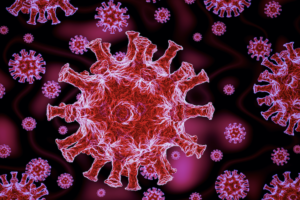What to Know About the Novel Coronavirus (COVID-19)
This post displays information that is current as of April 13, 2020. We will continue to update it as the COVID-19 situation develops.
The novel coronavirus disease (COVID-19), classified as a pandemic by the WHO, has significantly disrupted everyday life across the country and the world. As cases continue to skyrocket, most Americans are self-isolating in their homes for the foreseeable future in an effort to stop the spread of the virus.
It is undoubtedly a difficult time for everyone, but osteopathic physicians on the front lines of this crisis are encouraging all patients to focus on patience and awareness, rather than panic and anxiety.
What are the symptoms of COVID-19 and what is its incubation period?
The primary symptoms can include fever, cough, and shortness of breath. The incubation period is believed to be between two and 14 days.
Who is at risk of contracting COVID-19?
COVID-19 spreads via respiratory droplets, primarily from an infected person’s cough or sneeze. Some people who contract COVID-19 have no symptoms or mild symptoms, while others develop severe illness and die from the disease. Data suggests that elderly patients and people with compromised immune systems may be more likely to develop severe illness after contracting COVID-19.
How can people prevent transmission?
The same methods people use to prevent colds and the flu can prevent COVID-19 transmission: wash your hands frequently and for at least 20 seconds, cover your mouth when you cough or sneeze, avoid going to work or school when you’re sick and avoid touching your face or eyes with unwashed hands.
Christopher Cirino, DO, an osteopathic infectious disease specialist in Portland, Oregon, strongly encourages practicing social distancing. “If you’re sick, you know you should stay home,” he says. “But if you’re healthy, you should stay home right now, too. We want to protect our at-risk population, which would be caregivers, and the populations with the greatest risk for severe consequences.”
Outside of washing their hands, what are some other good preventative measures people can take?
Tom Moorcroft, DO, a family physician who focuses on infectious diseases, says, helping support the body’s self-healing mechanisms is essential.
“The immune system is critically important, and many patients can keep it healthy by getting the sleep they need, eating the right amount of vegetables and fruits, and exercising and getting plenty of fresh air. We can all also take time to relax and try to reduce stress and panic.”
What should patients do if they think they have COVID-19?
If you’ve had close contact with someone who has COVID-19 or has traveled to an area with COVID-19 cases, the CDC recommends calling ahead to tell your physician you may have been exposed, before following their instructions for possible testing. More advice for patients who suspect they have COVID-19 is available here. If someone in your home has COVID-19, or suspects they might, more advice is available here.
Are facemasks necessary or a good idea to wear in public?
The CDC recommends that people wear a facemask to protect themselves and others. People who have COVID-19 and are showing symptoms should wear a facemask, according to the CDC. Only health care professionals should wear facemasks/respiratory protection, such as an N95 facemask, when treating or examining a patient who has or may have been exposed to COVID-19.
Is there any truth to rumors that hydroxychloroquine may be an effective treatment?
Richard Bryce, DO, a family physician in Detroit, discourages patients from taking medications unless they are prescribed by a physician like himself. He says hydroxychloroquine has not yet been proven to be effective for COVID-19 and that to avoid risk of harm, it should be avoided by patients until further testing is done.
“At my hospital, we’re doing a study on hydroxychloroquine, which is great, but the data is only strong enough to start studies, not to use as treatment,” he says. “There are huge, harmful side effects, and you can die from taking it. We want these drugs to make a difference, but we also want them to be safe.”
Visit the following sources for regular updates, including Doctor Mike, aka Dr. Mikhail Varshavski, DO:
CDC COVID-19 landing page
WHO COVID-19 landing page

